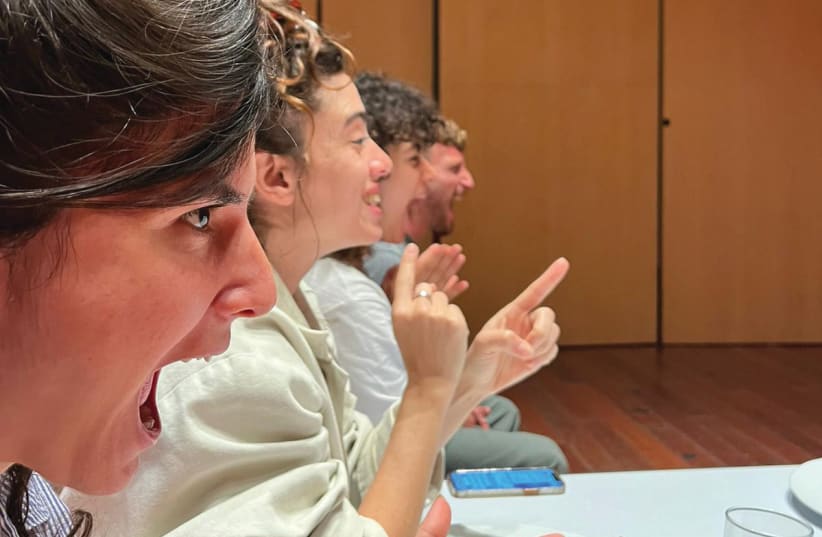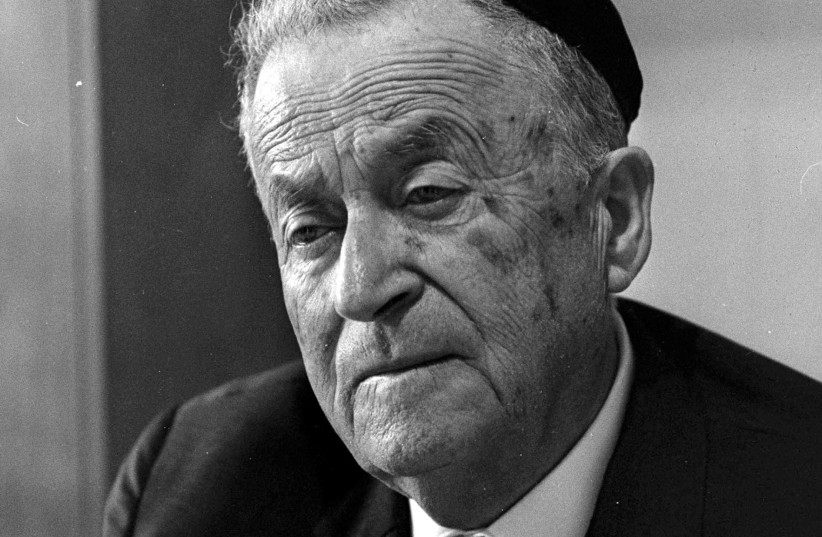Uri Agnon has dug into verbiage, of all sorts of ilks, in the past. Back in 2016 he put together an opera he called Word Problems. That was based on a script culled solely from snippets mined from Israeli school textbooks and set to music.
Now the London-based, Jerusalem-born composer, writer and activist is back here to present Homework: A Wartime Musical Guide for A Peaceful Home, which is due to air three times at the Tel Aviv Museum of Art (June 20-22).
This time Agnon – who also happens to be the great-grandson of late Nobel Prize laureate writer Shai Agnon – has gone for the political jugular, feeding off the frenetic, taut, charged spirit of the times to confront the societal climate, as the country wrestles with tragedy and with personal and collective chasms.
Musical theatre
The show, directed by Ilil Lev Kenaan, features four actors and a dining room table equipped with various eating utensils hooked up to an intricate electronic musical system. As each actor says her or his lines – there are three Hebrew-speakers and one English-speaker – they intermittently raise a cup, plate, or some other relevant artifact, which then underscores what they are saying by emitting a musical sound.
Homework is designed as the second part of a trilogy – which started with Word Problems – of musical theatrical creations that feed off quotidian documentary texts. It is a fascinating notion whereby Agnon cherry-picks expressions, single words, and comments from a slew of sources, such as social media formats and mainstream media, and slots them into entirely different sequences and contexts.
In so doing, one might argue, he takes an antithetical line to the one followed so successfully by his venerated forebear. While Shai Agnon was a master of verbal creativity, albeit in “interesting” antiquated Hebrew, his great-grandson takes a different approach to the written word.
Similarly to the way a record producer often operates, chopping and changing bits of musical material that has been laid down by the artists in a studio, and creating new progressions from different sessions, Uri Agnon took vignettes from articles, interviews, and TalkBack exchanges, on political topics from the last couple of years and wove them into something akin to a coherent dialogue enacted by the four protagonists.
Perhaps unsurprisingly for an artist who tends to keep his exploratory fingers in numerous pies, Agnon likens the textual crafting continuum to a process of discovery, much like the activity of a painter or sculptor.
“It is always, simultaneously, an act of trying to expose something but also of conscious manipulation,” he explains.
For a venture that takes a sober look at the incessant political discourse in this country, Agnon’s use of the word “manipulation” in the course of his work rings out loud, clear, and even a little abrasive.
However, Agnon’s intent in Homework appears to be free of any ulterior motive, which, naturally, is generally not the case with the goings-on in the political arena. Then again he points out that we all have our personal agendas, even if they are not basically destructive on a large scale or designed to further our own interests to the detriment of the other party.
That does not mean we should turn a blind eye to the machinations involved. Agnon, for one, is intensely interested in what lies behind the expressions he has sifted through and artfully slotted into their new performative milieu. “Part of what attracts me in this work, and in the previous one, is how to take a critical stance on the manipulations we carry out with language, and the manipulations others do with language, in their dealings with us.” Seems we all get up to it, each for our own reasons.
It is a perplexing and frustrating state of affairs. Most of us express ourselves with words, but words can be interpreted, or misinterpreted, by different people in vastly divergent ways.
That is even without addressing the contrasting – and sometimes highly comical – meanings attached by the British and Americans to the same word.
Some Americans, for example, use “suspenders” to keep their pants (trousers) up, while in Britain they are a lingerie item for women.
In darker verbal climes, when my parents recalled friends of old who had been through “the camps,” it became clear to me at a very young age that “camps” was a Holocaust-related term. Hence, when I heard others talking about summer “camps,” rather than thinking about vacation-time fun I immediately conjured up horrific images of suffering and Nazi brutality.
Agnon is fully aware of the perils of that minefield and how an innocent remark can stir up personal hornet’s nests.
“There is always a connection between words and power,” he observes. “Yes, you can hurt people. And meanings can be insinuated in all sorts of ways.”
For Agnon, that applies to language as a whole. “There are contexts in which, for example, speaking Arabic can have ramifications.”
That reminded me of when I was on a London Underground train, back in the 1980s, an hour or so after the IRA carried out a terrorist attack, and I was amazed and gratified by the fact that the two men sitting opposite me were chatting away, perfectly audibly, in an unmistakable Irish accent.
Art is generally a relatively safe zone for engaging in issues that elsewhere might generate heated, if not downright violent, exchanges. Agnon masterfully exploits that to the max, as the characters in Homework wend their way through the morass of perilous subject matter, gingerly and darkly comically doing their utmost to give as wide a berth as possible to anything that could be even remotely considered political or contentious.
“Theater is a powerful means for facilitating political criticism and discourse,” he notes. “There is the performative element to that, which is part of all politics.”
Fair point. As a frequent visitor to the Knesset, many years ago, when my mother was on the – nonpolitical – staff there, I occasionally dropped by the spectators’ section of the chamber, where I could watch MKs putting on a show of righteous indignation and castigating each other, employing the most caustic turns of phrase, only to see the very same “warring parties” enjoying a coffee together shortly afterward in the Knesset restaurant. The show was clearly over and they could get back to “normal.”
SUCH A definitively non-establishment work could, of course, look out of place in a standard auditorium setting. Homework will be performed in the Shidlovsky Auditorium of the museum.
“It is a multipurpose venue,” Agnon explains. “It is not a fixed seats-and-stage arrangement. There will be seating, but it will look far more just like a room, with everyone on an equal footing.”
You couldn’t get further away from a political mindset if you tried.
The play is designed to spark food for thought about how we conduct ourselves, societally, in these here parts, and, Agnon hopes, may dish up some surprises.
“Lots of the work is organized, and is based on a choreographic dynamic, but there is also room for the actors to improvise. They surprise me, too, all the time,” he laughs.
That infers an animated continuum for one and all. “That infuses the work with vitality,” Agnon states. “Working with Ilil Lev Kenaan also brings the whole thing to life. She brings a lot of her stage and dramatic ethos to this situation. It is an ensemble creation.”
For tickets and more information: https://tamuseum.org.il/he/exhibitions-and-events

